Pakistan, China, Russia, Iran call for cooperation on Afghanistan’s security crisis
Fourth quadripartite meeting on sidelines of 80th UNGA focused on Afghanistan’s security, humanitarian crisis
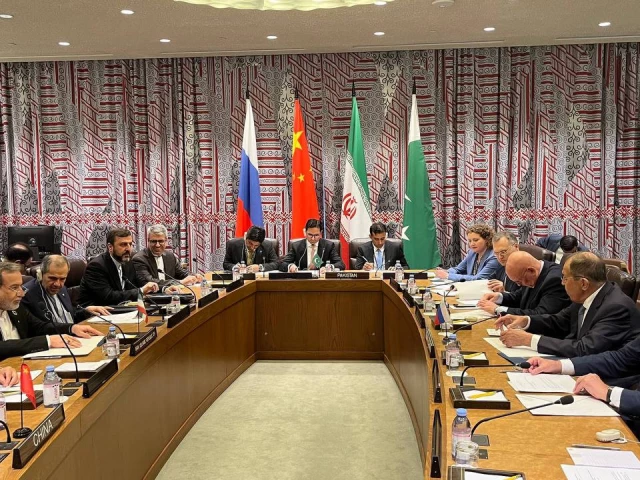
Pakistan, China, Iran, and Russia expressed deep concerns over the growing security threats in Afghanistan, particularly the continued presence of terrorist groups operating from Afghan soil and emphasised the urgent need for regional cooperation to address the rising instability.
The Fourth Quadripartite Meeting of Foreign Ministers, convened on the sidelines of the 80th United Nations General Assembly, focused on the dire security situation, the ongoing humanitarian crisis, and the country’s economic recovery.
In a joint statement issued at the conclusion of the meeting, the four sides reiterated their support for Afghanistan's sovereignty, calling for the nation to remain independent, united, and free from the threats of terrorism, war, and narcotics.
The countries emphasised the urgency of regional collaboration to stabilise Afghanistan, citing the significant risks posed by terrorist groups operating from Afghan soil.
Joint Statement of the Fourth Quadripartite Meeting of Foreign Ministers of China, Iran, Pakistan, and Russia, held on sidelines of UNGA at New York on 25 September 2025. pic.twitter.com/fxGDGGIJtU
— Mohammad Sadiq (@AmbassadorSadiq) September 26, 2025
"The four sides expressed deep concern over the security situation related to terrorism in Afghanistan," the statement noted, "particularly the continued presence of terrorist groups such as ISIL, Al-Qaeda, Tehrik-i-Taliban Pakistan, and the Eastern Turkestan Islamic Movement, among others." These groups, the ministers asserted, represent a serious threat not just to Afghanistan but to global security as well.
The representatives underscored the importance of effective counter-terrorism measures, urging the Afghan authorities to fulfill their international obligations by dismantling and eliminating terrorist groups.
"We call on the Afghan authorities to take effective, concrete, and verifiable actions to combat terrorism," the statement read, "including preventing recruitment, fundraising, and access to weapons, and dismantling terrorist training camps on Afghan soil."
In addition to security, the four sides discussed Afghanistan's economic recovery, with a particular focus on combating the rise of synthetic drugs and facilitating the return of Afghan refugees. The ministers expressed support for measures aimed at reducing the cultivation of opium and combating narcotics trafficking.
“The four sides commend Afghan authorities' efforts to reduce the cultivation of traditional opium,” the joint statement noted, calling for comprehensive measures to combat the production of methamphetamines and other synthetic drugs.
They also urged greater international support for Afghanistan, especially in terms of humanitarian assistance. "We call on the international community to intensify emergency humanitarian aid for the Afghan people," the statement said, stressing the need to provide support without political conditions attached.
The four countries reiterated the importance of an inclusive governance system in Afghanistan that reflects the needs of all ethnic and religious groups, with a particular focus on ensuring women's rights to education, employment, and participation in public life. "Women's access to education, economic opportunities, and basic services is essential for the stability and prosperity of Afghanistan," the statement affirmed.
Read: PM hails historic response to Indian aggression, calls for peace and dialogue at UNGA session
The role of NATO in Afghanistan’s current plight was also discussed during the meeting as the ministers pointed out that NATO members bear the primary responsibility for the ongoing crisis and urged them to lift sanctions on Afghanistan and return the country’s overseas assets.
“NATO members should create opportunities for Afghanistan’s economic recovery and development,” they said, advocating for a holistic approach to the nation’s reconstruction.
The foreign ministers also called for enhanced counter-terrorism cooperation at both bilateral and multilateral levels. They emphasised that Afghanistan should be supported in taking comprehensive measures to fight terrorism and prevent the use of its territory against its neighbors and beyond.
"The sovereignty, independence, and territorial integrity of Afghanistan must be respected," the statement concluded, opposing the reestablishment of military bases in and around the country by those responsible for its current situation.
The meeting was a significant step toward strengthening regional cooperation on Afghanistan, with the ministers acknowledging the ongoing efforts of regional countries, particularly Pakistan and Iran, in hosting millions of Afghan refugees. The four sides expressed their commitment to continued collaboration to help Afghanistan recover from decades of conflict and instability.
In closing, the ministers expressed their support for diplomatic efforts aimed at resolving Afghanistan's political issues. "We emphasise the role of regional frameworks such as the Moscow Format and the Shanghai Cooperation Organization in facilitating a political settlement," the statement said, welcoming recent discussions in Dushanbe, Tajikistan, and encouraging the continuation of quadrilateral consultations on Afghanistan's future.

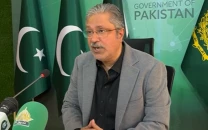

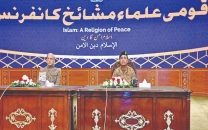

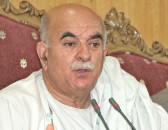
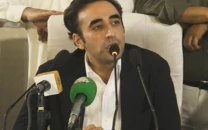
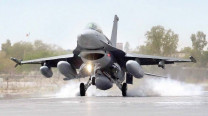





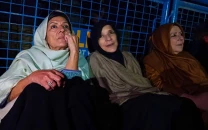






COMMENTS
Comments are moderated and generally will be posted if they are on-topic and not abusive.
For more information, please see our Comments FAQ